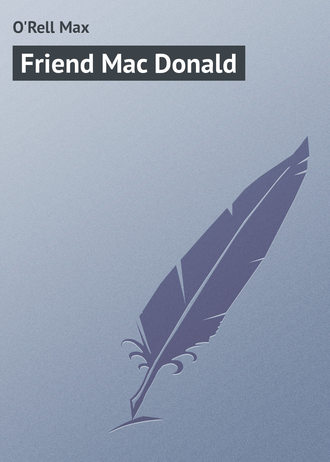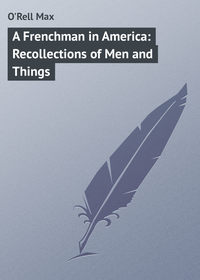 полная версия
полная версияFriend Mac Donald
The explanation which seems to be the most plausible is this:
The Countess of Salisbury, King Edward III.'s mistress, dropped her garter at a ball. The king picked it up; but, as the worthy descendant of a bashful race, he did not attempt to replace it, but turning towards his courtiers, said:
"My lords, honi soit qui mollet pince."
Then he advanced towards the countess and gave her her garter.
The king's expression became corrupted into:
Honi soit qui mal y pense.
This is the correct version, you may depend on it.
The Scots are a nation of hardy, valiant men, whom the English never would have succeeded in conquering by force of arms.
The Scotch will tell you that it was not England that annexed them, it was they who annexed England. Let us not grudge them this consolation, if it gives them any pleasure.
It is a fact that, on the death of Elizabeth, James VI. of Scotland – Mary Stuart's son – was called to fill the English throne, and thus united the crowns of England and Scotland.
But these conquering Scots begin to perceive that they are treated rather like conquered Scots at the Palace of Westminster, and they do not like it.
"They are very quiet under it," you may say; "one does not hear them complaining like the Irish."
That is true: Donald is patient, and knows how to bide his time.
The Irish question overwhelms every other political one just now in England. We all know that the Irish demand Home Rule, and as we do not hear the Scotch and the Welsh talked of, we conclude that these two peoples are comfortably enjoying life under the best of possible governments.
Scotland and Wales content themselves for the present with sending Liberal members to the British Parliament. But with them the word "Liberal" has not the political sense which it possesses in England, it has a rather revolutionary meaning. I do not mean by this that it implies an idea of rebellion.
No. But in their vocabulary it is almost synonymous with autonomist.
The English Liberals are men who are convinced that things are not perfect, and who admit the possibility of reforms.
In the eyes of the Scotch, Liberalism consists in preparing to ask one day for a great reform: Home Rule. Before ten years have passed, we shall see Scotland and Wales electing Home Rule candidates, as Ireland is doing now.
The Scotch will consent to remain British on condition that the English allow them to become Scotch – that is to say, to manage for themselves matters which have no connection with the Empire, and concern the Scotch people alone; such as religion, education, and the administration of justice. They are too shrewd to desire to become once more Scots pure and simple, and so renounce their part and profit in the gigantic concern called the British Empire. They will continue to send members to Westminster to take part in the work of governing the Empire, but they will have a parliament or a council at Edinburgh, whose business it will be to look after matters purely Scotch.
They would be willing to walk hand-in-hand with England, but not by means of handcuffs.
The English are fond of talking of Scotland as if it were a county of England. The Scotch mean that Scotland shall be Scotland.
"Let the English look after England," they say, "and we will look after Scotland. As soon as a question relating to the British Empire arises, we will be as British as they. We do not want to destroy the unity of the Empire, or to break off our relations with the Parliament; but we simply wish to do as we like at home."
There is nothing extraordinary in such a demand.
When the Scotch, or the Irish, win a battle, it is immediately announced in the papers that "the English have gained a victory." But let an Irishman or a Scotchman commit a crime, and John Bull quickly cries out:
"It is an Irishman," or "It is a Scotchman."
"Let it be each one to himself, and each for himself," says Donald, "so long as it is a question of England or Scotland. But when it is a question of the great Motherland, then we will all be Britons."
The English have this good point: they know that it is good policy not to try and prevent the inevitable, but rather to put a good face upon it. They know that that which is given ungraciously is received ungratefully.
They are now administering the eighty-seventh coercive pill to the Irish. That will be the last.
In two or three years time, Ireland will belong to the Irish, as, later on, Scotland will belong to the Scotch.
The United Kingdom will only be the more powerful for it. Having no more internal squabbles to fear, it will present a formidable quadruple breast to the outer world.
London will be the political centre of an immense imperial federation. England, Scotland, Ireland, Wales, India, the Cape, Canada, Australia, all will be represented in a Parliament really Britannic. Their capitals will be the respective leaders of this grand team.
The British Empire will be built upon hearts in all parts of the globe.
If there is no longer any United Kingdom, neither will there be a Disunited Kingdom, and instead there will be something much more imposing, much more powerful, there will be
1
I mean "the people." As for the higher classes, their manners and dress are perfectly English; they only differ in their political and religious opinions.
2
I trust to the intelligence of the reader to distinguish here between the well-bred Scot and his humbler brethren.
3
It was thus that the defunct was referred to until after the funeral was over.
4
Dean Ramsay relates that in Inverness, forty years ago, the coffin of a certain laird only reached the cemetery at the end of a fortnight.
5
The finest edition of the Songs of Scotland is that recently published by Messrs. Muir Wood, of Glasgow.
6
The Scotch dialect has sometimes been called the Doric of Great Britain.







